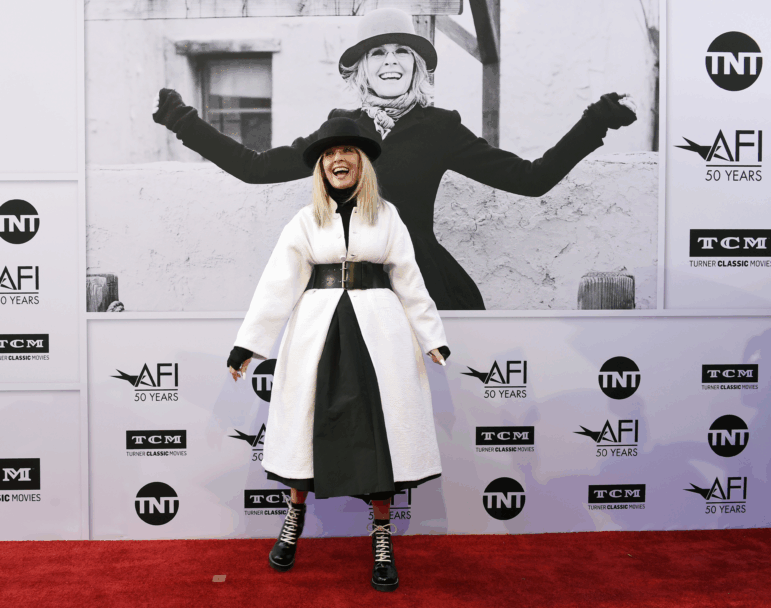Diane Keaton, who remained one of Hollywood’s quirkiest and most beloved actors decades after her Academy Award-winning performance in the movie Annie Hall, has died aged 79.
Her film producer confirmed her death to NPR Saturday.
When I met Keaton for an interview in 2014, she was sporting her trademark look: a bowler hat, tinted glasses and oversized clothes.
“Clothing that actually hides the body,” she half-joked. “There’s a lot to hide in my case, so I’m the only remaining person on Earth with this particular look.”
Keaton was really something of a fashionista, inspiring generations of women with her unconventional lifestyle. Onscreen, she was known for playing endearing, unique and sometimes eccentric characters.
In one of her memoirs, Keaton wrote about aging and love in Hollywood and becoming a parent late in life. She was also upfront about some of her insecurities; she fretted about aging, her hair thinning, her eyes drooping. But Keaton told me that later in life, she had finally come to accept that all flaws are beautiful.
“I feel that wrong can be right. It can be right in a lot of ways,” she said. “So all those things that you’re disappointed with in yourself can work for you.”
She was born Diane Hall in Los Angeles in 1946, the daughter of real estate broker and civil engineer Jack Hall. Her mother Dorothy was once crowned Mrs. Los Angeles.
Keaton said her mom cheered her on as she pursued her dreams of becoming a singer and performer in New York. After studying at the Neighborhood Playhouse in the 1960’s, Keaton ended up an understudy in the original Broadway production of the rock musical Hair.
“It was wild. It was unexpected,” she said. “But I could see that I really wasn’t a hippie. I knew that I wasn’t a hippie in Hair.”
Keaton famously refused to go onstage nude for the final scene of Hair.
Then, along came Woody Allen, with whom she had a romantic relationship. Allen cast her in Play It Again, Sam, his play, then his movie. Also his film comedies Sleeper, Love and Death, Manhattan, and, of course, Annie Hall.
Keaton’s kooky, quirky role as Annie Hall and her “lah-de-dah” charm won her a best actress Oscar in 1978. She thanked Woody Allen in her acceptance speech and later, for her entire career. She stood by him throughout the controversy over allegations that Allen once molested his daughter, which the director denies.
“That’s never going to change,” Keaton said of her support for Allen. “He’s my very, very good friend.”
In Annie Hall, Keaton showed off her comedy and singing chops. But she also had dramatic film roles, most famously in The Godfather trilogy. Her character marries into the Corleone mafia family.
Her Godfather costar, Al Pacino, was one of her boyfriends in real life. Another of her real life loves, Warren Beatty, directed her in his 1981 film Reds.
In the historical drama about journalist John Reed, Keaton played his love interest, activist Louise Bryant.
“I loved her position in life,” Keaton said of her character, which she said played second fiddle to Reed (played by Beatty.) “And she wanted to be great. She wanted greatness in her. And fighting for herself, and failing and failing. I loved her for that. I loved her for her flaws. She was a difficult person who wasn’t very likable, yet I loved her.”
Jack Nicholson was also in Reds. He teamed up with Keaton again in 2003 for the comedy Something’s Gotta Give. In that movie, Keaton also played opposite Keanu Reeves.
Diane Keaton never married, though in films, she was one of the very few older American actresses who still got leading romantic roles. That was something actress Carol Kane, Keaton’s long-term friend, raved about at the time.
“She’s playing the love interest a lot,” Kane said. “You know, kind of passionately kissing and swooping into the bedroom…at an age when most people just sort of say, ‘OK, well, that part is over.’ I mean, she just gets more and more beautiful because she’s more and more herself.”
For years, Keaton acted in such films as Looking For Mr. Goodbar, The First Wives Club and Baby Boom. She directed the documentary Heaven in 1987. She also wrote books about her life, about architecture, photography and beauty; she collected photos of beautiful men, she renovated beautiful houses, and as a single mother, raised two beautiful children. When she turned 50, she adopted her daughter, Dexter and five years later, her son Duke.
“It’s an unconventional life, it’s true,” she told me. “But I don’t really see it that way, because I just think everybody has a pretty– is there a life that doesn’t have a story that isn’t pretty astonishing? I’ve never come across anybody who hasn’t. I just worked my way into the life that I have because I had a goal and it was very simple: I wanted to be in the movies.”
Keaton told me she was a late bloomer. But her fans might say death came to her far too soon.

